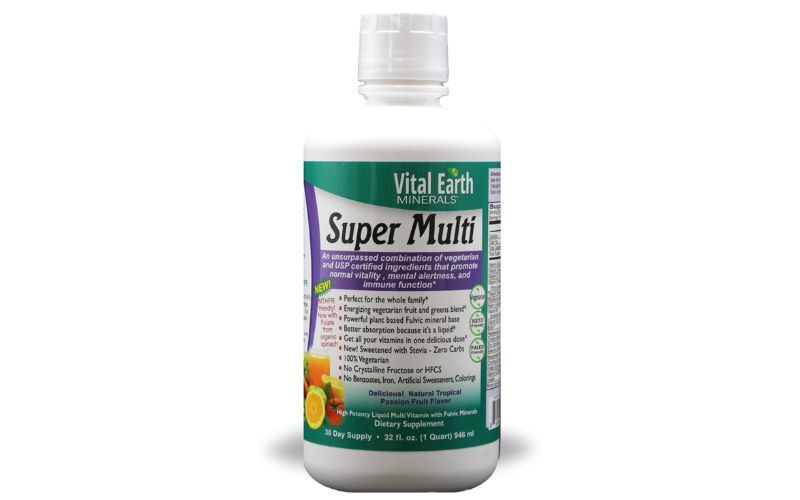Best Vitamins For Bone Health: A Comprehensive Guide
6th Feb 2025
To keep your bones strong and healthy, it's important to consider several factors, including physical activity and diet. Vitamins are crucial for bone health. They help support the structure, strength, and function of your bones. If you don't get enough of these key nutrients, you may face problems like osteoporosis, bone fractures, and weak bones.
This blog will discuss the best vitamins for bone health, the benefits of such vitamins, and how to introduce them into your diet to ensure that your bones are healthy and strong.
Boost your bone health today with the best Vitamins For Bones from Vital Earth Minerals – your strong, healthy bones await!
Importance Of Bone Health
Bone health is important for mobility, independence, and general well-being. Our bones serve as the skeletal framework for our body, safeguard our internal organs, and store important minerals. As we age, the bone mass will naturally decline, making us more vulnerable to fractures and other problems. Maintaining the health of our bones will prevent any problem associated with the loss of bone and keep your bones healthy and strong all your life.
Essential Vitamins For Bone Health
Various vitamins can improve the density of bones to facilitate calcium absorption and guide bone formation. Several such vitamins can be considered your top priorities:
1. Vitamin D: The Bone Builder
Vitamin D is very important for bone health. It is often called the "sunshine vitamin" because your body makes it through sunlight. Vitamin D helps your body absorb calcium from the food you eat. This allows your body to use calcium effectively for strong bones.
Benefits of Vitamin D for Bone Health
Boosts calcium absorption: Without enough vitamin D, your body cannot absorb calcium properly, weakening bones.
Supports bone mineralization: Vitamin D helps in bone mineralization. It is important to have strong and healthy bones.
Reduces risk of fractures: Vitamin D helps lower the chances of falls and fractures, especially in older adults.
Sources of Vitamin D
-
Sunlight exposure (15-30 minutes a day, depending on your skin tone and location)
-
Fatty fish (salmon, mackerel, sardines)
-
Egg yolks
-
Fortified foods (milk, cereals, orange juice)
-
Supplements (if necessary)
2. Calcium: The Building Block of Bones
Calcium is the most abundant mineral in the body, and it has a crucial role in the health of the bones. Your bones are primarily made up of calcium; therefore, having enough of this mineral is crucial to maintaining the density of the bones and preventing problems with the bones.

Benefits of Calcium for Bone Health
Maintenance of bone density: Calcium ensures that the bones maintain their density, thus becoming less fragile and more prone to fractures.
Promotes bone growth: It is essential for bone development, especially in children and adolescents.
Inhibits bone loss: Sufficient calcium intake can delay the normal bone loss of aging.
Sources of Calcium
-
Dairy products (milk, cheese, yogurt)
-
Leafy greens (kale, spinach, broccoli)
-
Fortified plant-based milk (almond, soy, oat)
-
Tofu, almonds, and figs
3. Vitamin K2: The Bone Strengthener
Vitamin K2 is the most underrated vitamin concerning bone health. It mineralizes bones and directs calcium to the bones instead of soft tissues like arteries. The bone strengthener vitamin aids in activating proteins responsible for regulating calcium so that it can be deposited correctly in the bones.
Benefits of Vitamin K2 for Bone Health
Increases bone mineralization: Vitamin K2 can activate osteocalcin, the protein that can fix calcium in the bone matrix.
Prevents calcium deposits in arteries: It helps prevent calcium from accumulating in arteries. This forces calcium into bones and teeth, preventing plaque formation in arteries and reducing the risk of cardiovascular disease.
Advances bone health in old age: It helps prevent a loss in bone density, especially in older individuals
How to Obtain Vitamin K2
-
Fermented foods like natto, kimchi, sauerkraut
-
Grass-fed meat and dairy products
-
Egg yolk
-
Liver from grass-fed animals
4. Magnesium: The Bone Helper
Magnesium is an important mineral for bone health. It works with calcium and vitamin D to build strong bones. Magnesium helps manage the amount of calcium in the body, supports bone formation, and aids in turning vitamin D into its active form. This active form helps with calcium absorption.
Benefits of Magnesium for Bone Health
Regulates calcium levels: Magnesium maintains the balance of calcium in bones and tissues, preventing calcium from accumulating in arteries.
Promotes bone formation: Magnesium is involved in bone remodeling, which maintains the structure of bones.
Reduces bone fragility: Adequate magnesium levels can prevent the loss of bone mass and reduce the risk of fractures.
Sources of Magnesium
-
Leafy greens (spinach, kale)
-
Nuts and seeds (almonds, sunflower seeds, pumpkin seeds)
-
Whole grains (brown rice, quinoa)
-
Legumes (black beans, chickpeas)
5. Vitamin C: The Collagen Connector
Vitamin C is essential for making collagen, a protein that supports bones. Without collagen, bones would become brittle and weak. Vitamin C also acts as an antioxidant, which helps protect bones from damage caused by stress and inflammation that can weaken bone tissue.
Benefits of Vitamin C for Bone Health
Promotes collagen formation: It plays a vital role in forming collagen and building the strength of the bones and joints.
Fosters the healing process: It allows the healing of tissues inside the bone along with mending the crack of the fractured bones.
Reduces Inflammation: The antioxidant feature of Vitamin C reduces the degree of inflammation. Inflammation is what promotes the decomposition of bones.
Rich Sources of Vitamin C
-
Oranges and lemon
-
Bell Peppers
-
Strawberry
-
Kiwi and papaya
-
Broccoli and Brussels Sprouts
6. Vitamin A: The Bone Growth Promoter
Vitamin A is important for bone growth and remodeling. It regulates the cells responsible for bone formation and resorption, ensuring that bones continue to grow and maintain their density throughout life.
Benefits of Vitamin A for Bone Health
Promotes bone growth: Vitamin A stimulates the activity of osteoblasts, the cells responsible for bone formation.
Aids bone remodeling: It supports the process of ongoing bone turnover, where new bone tissue is replaced.
Avert bone loss: Well-balanced vitamin A intake will minimize the risk of losing bones in elderly people.
Sources of Vitamin A
-
Beef, chicken, pork livers
-
Carrots, sweet potatoes, butternut squash
-
Dark leafy greens (spinach, kale)
-
Red bell peppers
7. Vitamin B12: The Bone Protector
Vitamin B12 is associated with the health of nerves and blood but is also responsible for maintaining bones. A lack of vitamin B12 can reduce bone energy and mineral density and increase bone fractures.
Advantages of Vitamin B12 in Maintaining Bones
Prevention of bone loss: Vitamin B12 deficiency results in osteoporosis and decreases bone mass.
Supports bone cells: It supports the production and maintenance of osteoblasts, the cells that build bones.
Increases bone strength: Adequate levels of B12 are linked with higher bone density and a lower risk of fractures.
Sources of Vitamin B12
-
Meat and poultry (chicken, turkey, beef)
-
Fish and shellfish (salmon, tuna, clams)
-
Dairy products (milk, yogurt, cheese)
-
Fortified plant-based foods (nut milks, cereals, nutritional yeast)
Verdict: Keep Your Bones Strong with the Right Vitamins
A constant process requires maintaining good nutrition, regularly exercising, and the right exposure to the sun. The bone is built by having the vitamins D, K2, and calcium in it, and it breaks when the bones don't have any or even when it contains vitamins such as C, A, and B12. These vitamins can be obtained through natural food sources or supplements, ensuring optimal bone health and a reduced risk of bone-related issues as you age.
Frequently Asked Questions
How much vitamin D do I need for bone health?
Recommended daily intake of vitamin D changes with age. Adults require about 600 to 800 IU daily, while those above 70 years need up to 800 to 1000 daily. Always consult a healthcare provider for personal recommendations.
Can I get calcium from plants?
You can get sufficient calcium from plant-based sources like leafy greens, fortified milk, tofu, and almonds. It’s essential to consume a variety of these foods to meet your calcium needs.
Is it necessary to take vitamin supplements for bone health?
You need supplements if you cannot reach your vitamin from the diet itself. Always consult before starting any supplements to ensure their appropriateness for your health needs.






